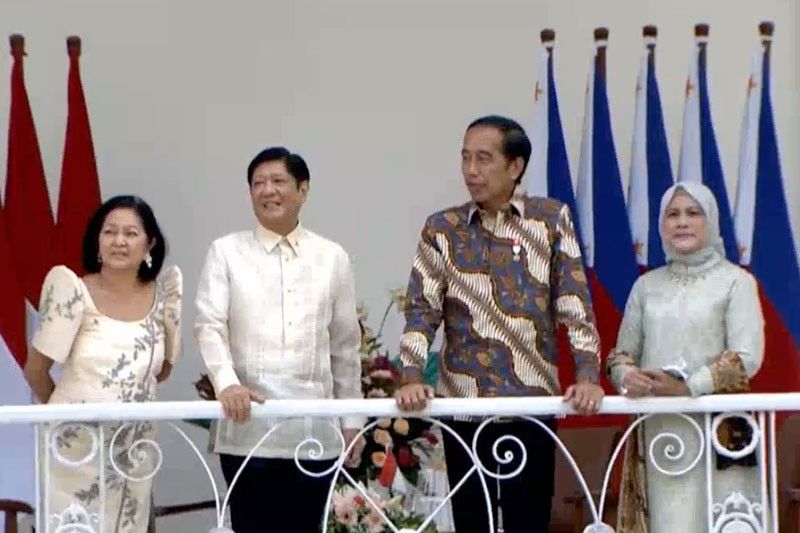Marcos, Widodo: Partnerships crucial to recovery

BOGOR – Partnerships are crucial to the tasks of steering economies to recovery amid the pandemic and of keeping peace and stability in the region, President Marcos and Indonesia President Joko Widodo agreed at their bilateral meeting here yesterday.
Marcos said partnerships like the one between Manila and Jakarta are critical in promoting regional development and maintaining stability “as we grow out of the pandemic economy.”
He noted that the two countries would be celebrating the 75th year of their diplomatic relations in two years.
“Although our relations go much further than that because we consider Indonesians not only a neighbor, not only a friend, but kin,” Marcos told Widodo at their bilateral meeting at the Bogor Presidential Palace.
“It is going to be the strong partnerships that we will make as we slowly come out of the pandemic economy, it is what is going to lead us to success... And that is why we go once again to our friends and to our partners around the world, especially in the region,” he added.
Marcos said such partnerships would also “keep the stability of all of our plans and what we are hoping to do in the next few years.”
To further strengthen their relationship, the Philippines and Indonesia have agreed to form task forces to discuss ways of achieving their common goals.
“Our discussions progressed so rapidly that we, the President and I, have agreed to organize task forces already to meet and discuss even at a technical level, no longer at the political or the diplomatic level, but at a technical level, so as to be able to take full advantage of the opportunities that we feel are available to us, and that we will need to exploit to succeed in the near future,” Marcos said.
Indonesia is the Philippines’ eighth largest trading partner, with a total trade volume of $9.5 billion. It also hosts about 7,400 Filipino workers.
Marcos and Widodo also tackled the role of the Association of Southeast Asian Nations (ASEAN), as the region faces difficulties and volatilities related to geopolitics.
“And we agreed that ASEAN is going to be the lead agent in the changes that we would like to see in continuing to bring peace to our countries. And again, the assistance that we have received from Indonesia has been a very important part of that,” Marcos said.
Widodo cited the importance of strengthening ASEAN centrality and unity and the implementation of the ASEAN Outlook on the Indo-Pacific through “concrete and inclusive cooperation.”
“Indonesia wishes to ensure that ASEAN remains an engine of peace, stability, peace and prosperity in the region. ASEAN must be able to address the challenges ahead and strengthen respect for the ASEAN Charter,” the Indonesian leader said.
Widodo said Indonesia would organize the Indo-Pacific infrastructure for next year and assume the chairmanship of ASEAN next year.
Trade, security cooperation
Widodo said he and Marcos have encouraged a significant increase in their trade folio, noting that trade between the two countries rose by almost 50 percent compared to last year. Indonesia has encouraged increase in export of food and beverages, pharmaceuticals, coconut and seaweed products, he added.
“I invite the Philippines to continue developing trade potentials as well as connectivity in border areas. I proposed the revitalization of shipping routes – Ro-Ro shipping routes between Bitung and Davao and reopening of Manado-Davao flight route,” Widodo said.
The Indonesian leader also called for intensified cooperation in infrastructure and strategic industries. He said a number of Indonesian state-owned enterprises have participated in development programs in the Philippines, citing the procurement of two landing platform dock vessels by PT PAL and a railway signaling project in Manila by PT LEN.
Widodo also expressed hope that the Philippines’ planned purchase of NC212i aircraft from PT Dirgantara would be realized.
“Going forward, I hope that more opportunities arise for Indonesian SOEs and private sector to support development in the Philippines,” he added.
Widodo said he and Marcos also agreed to review two border security agreements – the revised Border Crossing Agreement and the Border Patrol Agreement – so they would remain relevant to communities in border areas.
“We also commit to accelerate negotiations on the delimitation of continental shelf based on UNCLOS 1982,” he added.
Signed in 2014, the agreement includes the annexed charts showing the exclusive economic zone (EEZ) boundary of the Philippines and Indonesia in the Mindanao Sea and Celebes Sea in the southern Philippines and in the Philippine Sea on the southern section of the Pacific Ocean.
It is the result of 20 years of negotiation to delimit the overlapping EEZs of the two countries.
Widodo said the two countries also encouraged strengthening cooperation on safety and security of waters in border areas. He lauded the signing of the Agreement on Cooperative Activities in the Field of Defense and Security and the renewal of the Trilateral Cooperative Arrangement between Indonesia, the Philippines and Malaysia, which he said is very important to secure waters from bandits engaged in hostage-taking and kidnapping.
The two leaders also discussed strengthening ASEAN as well as implementing the ASEAN Outlook on the Indo-Pacific.
Marcos thanked Widodo for Indonesia’s unflinching readiness to strengthen its partnership with the Philippines.
“It was very natural for us in the Philippines to come and I think we made the right choice and we thank you once again for the openness with which you have received us and the openness – the willingness that you have shown to strengthen that relationship between the Philippines and Indonesia, which is our hope and it is what we are going to be working for,” he said.
Related video:
- Latest
- Trending
































